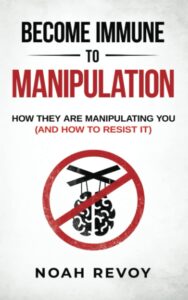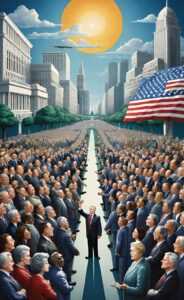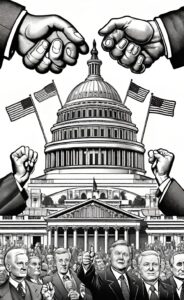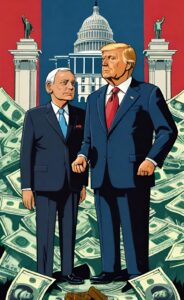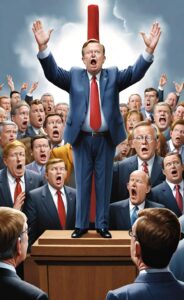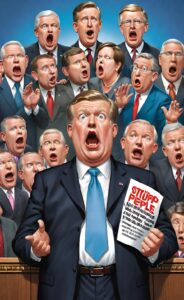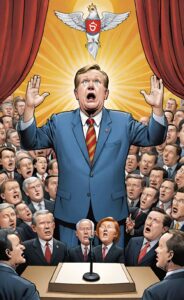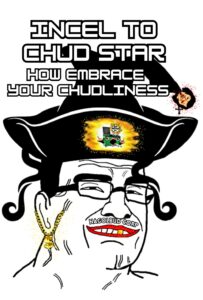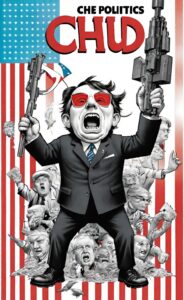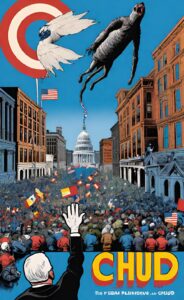In the world of politics, there is a group of individuals who believe in the supremacy of the state. They revere the state with religious fervor, finding solace in the power structures it provides. This political philosophy is known as statism, and its followers could be said to belong to the cult of politics. In this post, we delve into the complexities of this political belief and its implications on society.
Understanding Statism: The Principle of State Control
Statism isn’t just a political ideology, it’s a credo that places the government and politicians on a pedestal, arguing for its preeminent role in managing both economic and social affairs. The beating heart of statism is the firm belief that the state is the best vehicle for realizing and preserving the common good. Consequently, statists argue that the state should be endowed with sweeping powers to intervene in societal and economic matters.
This ideology strikes a sharp contrast to more libertarian viewpoints, which advocate for minimal state intervention and maximum individual freedom. Statists, however, see the state as the guiding hand that can shape society and navigate it through the complexities of economic and social dilemmas.
What ties all statists together though, is their faith in the power and authority of the state, an authority they believe should not just be respected, but actively sought and cultivated. It’s this steadfast belief in government supremacy that forms the bedrock of statism.
Parallels Between Statism and Religion: The Sacred State
The link between statism and religion might not be immediately apparent, but a closer examination reveals startling similarities. Just as religion places an omnipotent divine being at the center, statism elevates the government to an almost deified status. To the followers of statism, the state is a holy entity, imbued with the power to forge order, ensure safety, and champion social justice.
This faith in the state mirrors religious devotion in its adherence to doctrines, its observance of rituals like voting, and its respect for traditions like income taxes. The state, to statists, becomes an infallible entity that deserves reverence, a belief strikingly akin to how followers of a religion revere their deity.
But there’s more. The statists’ devotion is not just in accepting the state’s superiority; it lies in their deep-seated belief that the state is essential to individual and collective progress. They willingly submit themselves to the authority of the state, much like religious adherents submit to their God.
The parallels are clear, just as religion seeks salvation and order in a divine entity, statism seeks these in the state. The devout statist, therefore, could be said to belong to a political religion, with the state as its supreme deity. The comparisons are indeed thought-provoking, showing how politics can inspire devotion akin to religious fervor.
The Impact of Statism: A New Social Order
Embracing statism isn’t a mere political choice, it’s like hitting the reset button on society’s operating system. The effects ripple outward, reaching every stratum and corner of the community. It ushers in an era where the government wields the scepter, steering all socio-economic endeavors.
On the economic front, statist societies typically see a shift towards centralization. The state becomes the grand puppeteer, pulling the strings of the economy, deciding what to produce, how to produce, and who gets what. From small local businesses to sprawling multinational corporations, all economic entities fall under the state’s watchful eye.
In the social sphere, the media, often hailed as the fourth pillar of democracy, may also fall under state control. With the power to dictate the narrative, the state can shape public opinion, often molding it to match their policies and ideologies. Regulatory control seeps into every corner of life, guiding everything from education systems to cultural norms.
Within this newly forged social order, individuals find themselves increasingly reliant on the state. Whether it’s for jobs, welfare, or security, citizens turn to the state, leaning on it like a crutch for their wellbeing. The government, in this construct, isn’t just a silent spectator, it’s an active player, controlling and directing the flow of all life.
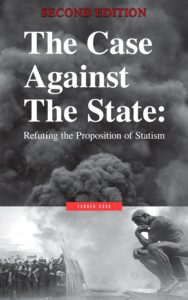
> Check Current Book Prices <Criticisms of Statism: Freedom and Autonomy at Stake?
While statism places the state in the role of a benevolent guardian, not everyone agrees with this rosy picture. A number of individuals raise their eyebrows at the seemingly unchecked power of the state, arguing that it poses a serious threat to individual liberty and self-determination. Critics contend that a system so heavily leaning on the state has the potential to morph into a despotic regime, where freedoms may be conveniently brushed aside in the name of the collective good and conformity bias.
Dissenters point towards chilling instances from history where state power ran amok, resulting in grievous human rights violations and economic catastrophes. They argue that such events should serve as stark reminders of the dangers of an omnipotent state.
Critics also argue that statism stifles economic innovation and dynamism. By centralizing control of the economy, they claim, statism discourages entrepreneurial spirit and inhibits competitive forces that drive efficiency and innovation. Additionally, they express concern over the erosion of personal autonomy.
cit·i·zen – a legally recognized subject.In a state-dominated society, every facet of life, from education to employment, can come under government control, leaving little room for individual choice and initiative. In such a setup, the state’s interests may take precedence over personal freedoms, creating an environment where citizens may feel more like subjects than participants in their own lives.

The Illusion of State Benevolence: Examining the Reality
A cornerstone of the statist belief system is the assumed benevolence of the government, an entity seen as a guardian angel, serving the greater good. But critics argue this could be a mirage, with the potential to lead society astray. They stress that states, much like any other human-led institutions, are prone to error and can become breeding grounds for corruption.
The centralization of power, which is a fundamental characteristic of statism, could easily tip the scales from benign control to harmful manipulation. The result? Instead of promoting justice and equality as intended, the state could end up perpetuating the very issues it aims to combat. Therefore, it’s crucial to look beyond the veil of benevolence and examine the true nature of the state’s power. Unchecked authority, in any form, could be a slippery slope, and it’s our collective responsibility to ensure that the balance of power remains in the interest of the public, not against it.
The Future of Statism: Sustaining the Cult of Politics
The journey of statism as a political religion is undoubtedly captivating, filled with passionate believers and skeptical critics. Looking ahead, the endurance of this ideology hinges significantly on the state’s prowess in fulfilling its solemn promises. Just as a religious follower expects miracles from their deity, statists have great expectations of the state’s potential to maintain social harmony, financial equilibrium, and overall societal prosperity.
Yet, the sustainability of this political faith is deeply intertwined with the state’s performance. For the cult of politics to persist, the state must continually prove its merit, demonstrating its indispensability in guiding society’s progress. But herein lies a fascinating conundrum. Can the state consistently meet these high expectations, or will the weight of such aspirations become its own downfall?
The future of statism is thus shrouded in uncertainty, akin to a cliffhanger in a riveting novel. Will the state succeed in maintaining its sacred status among its believers, or will it face a crisis of faith? As observers of this captivating political saga, we can only watch, analyze, and learn. As the narrative unfolds, it promises to enrich our understanding of political faith, the allure of power, and the human propensity to seek order in complex systems.









